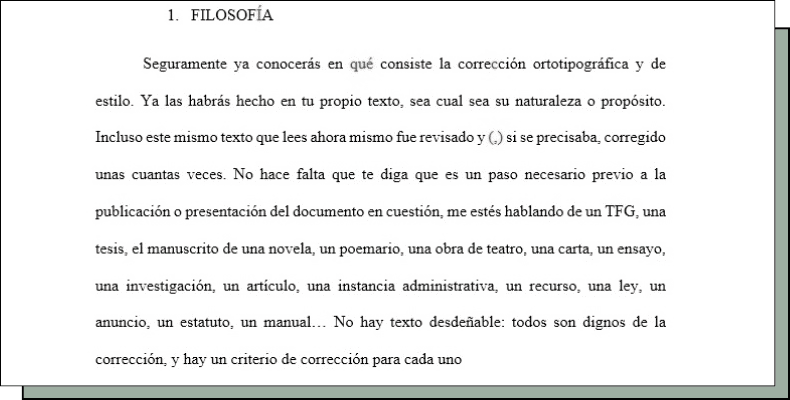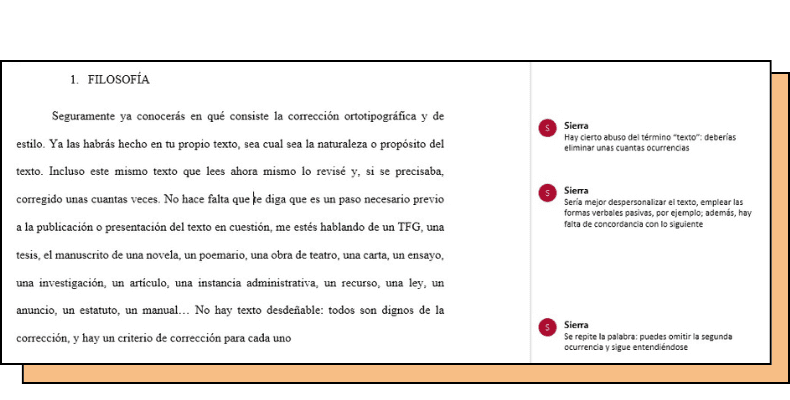Proofreading and Writing Services
“Tell me more” Method
Orthotypographical corrections
At this level, I only point out possible spelling mistakes that may have been overlooked (which happens to everyone: just look at the Twitter of any famous writer), whether the use of a certain punctuation mark is appropriate in that context, whether these “quotation marks” or the «others» are more relevant, whether it is necessary to italicize a fragment in regular typeface; or alternatively, in bold. In other words, here I limit myself to making the text more digestible, to better understanding it formally, to ensuring correctness. Mere orthotypographical correction is usually more than sufficient for texts that are not so literary, artistic, or philosophical.

Style corrections
In the style correction service is where the “Tell me more” comes in; through marginal notes, I indicate whether that expression is appropriate or if it can be rephrased differently (to give it more strength, more expressiveness, to be more relevant to, for example, the character’s register…); also if there is an abuse of the same expression throughout the document (unless it has a literary justification) or if there is redundancy of a word, as well as examining the logical correctness of the expressions and the entire text in general.

Document fixing
This service includes presentation elements such as text alignments, size, fonts, dialogue dash, Spanish quotation marks, numbering and lists, text styles, etc. After years of experience, I have seen that the work of writing texts and knowledge in word processors (such as Word) do not always go hand in hand, for that reason, I offer you a correction of the text format, always following your guidelines and instructions. Basic fixing is a job that goes hand in hand with proofreading services, at no extra cost; but if you do not want proofreading and only need this service, you can check its individual price in the “Rates” section.


Conversion from physical to electronic document
Some practical examples of text correction services
Academic papers:
It won’t be the first or the only time that we fail the subject, the Bachelor’s Final Project (TFG), the Master’s Final Project (TFM), or the doctoral thesis due to a significant number of grammatical errors, expressions lacking sense, or logical incoherence. Additionally, it is especially suitable for non-Spanish-speaking foreign students.
Literary texts for publishers:
The situation here is more complex, and we face several scenarios. The most common is the initial rejection without clear explanations. The rejection criteria of a publisher are diverse and, in the age of immediacy, are rarely explicitly detailed. Could the lack of correction be the sole cause of rejection? It’s a possibility that cannot be ruled out.
Instances, requests, petitions, and other administrative documents:
They may not reject them outright (registry officials usually don’t take the time to read the documents submitted because it’s not their responsibility), but perhaps they won’t understand what we mean or it’s poorly expressed, and we have to repeat the process, or even it might be outright rejected.
Instances, requests, petitions, and other administrative documents:
They may not reject them outright (registry officials usually don’t take the time to read the documents submitted because it’s not their responsibility), but perhaps they won’t understand what we mean or it’s poorly expressed, and we have to repeat the process, or even it might be outright rejected.
Technical Manuals:
There’s hardly any rejection, of course, but we could accumulate complaints because customers don’t understand them or they lead to misunderstandings in the use of the product in question.
Laws, regulations, statutes, contracts, and other legal documents:
In this type of document, not only is orthotypographical correction important but also style correction for one reason: they are documents to regulate operation through rules, so a style correction would help you see if there are logical contradictions between their clauses or articles and mark possible ambiguities. If we want, for example, our neighborhood association to have a clear rule that does not allow for arbitrary interpretation, it is necessary to review the logical coherence of its clauses and articles.






